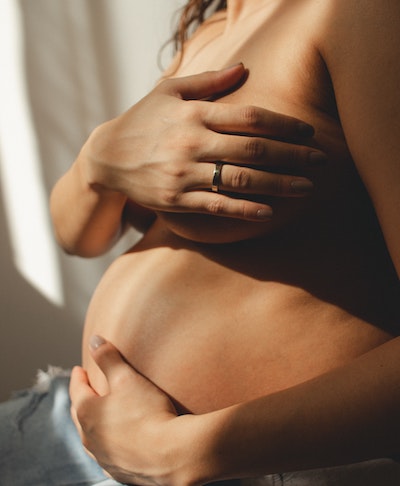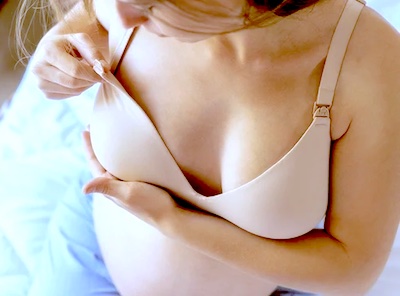Pregnancy can be overwhelming, bringing on so many emotional and physical changes. Some things that you experience during those 9 magical months may worry you – like the crusty nipples. In this article you find everything you should know about this condition – what causes it and how to heal your crusty and dry nipples.

Article By Edna Skopljak – Medical Doctor (MD)
Among other body changes, your breasts will start changing to be prepared for breastfeeding. Your breast milk production starts, the nipples are growing – and the breast skin can dry and even crack.
While cracked nipples during pregnancy are usually a normal condition for moms-to-be, they may sometimes point out some medical conditions that could be transmitted to your baby and affect breastfeeding.
That’s why it’s so important to find the cause and know how to treat your dry and cracked nipples.
I’m going to share some tips for relieving your sore and crusty nipples during pregnancy.
This article is not a substitute for medical advice.
Why Are My Nipples So Crusty During Pregnancy? – The Causes
Crusty nipples are a common issue when you are pregnant. During pregnancy, and postpartum, your breasts change. In order to prepare for breastfeeding, the breasts will grow, and the nipples will expand.
Nipple stretching may result in dry and itchy skin. Furthermore, nipples may peel, crack, and feel sore.
While the causes of nipples peeling during pregnancy are – in most cases – physiological, some medical conditions may be to blame. I know this may really concern you and just are many other moms you may now be wondering “Why are my nipples dry and flaky during pregnancy?”.
Your Breasts Prepare For Nursing
There is a simple physiological explanation. As the pregnancy progresses, and the pregnancy hormones do their job, along with other (wonderful or not-so-wonderful) changes, your breasts start preparing for the baby.
As the mammary glands begin producing milk and the milk ducts start filling, the breast tissue is expected to expand, leading to breast enlargement. The skin needs to stretch, to accommodate this tissue. And when it stretches, it becomes thinner and dry, . You may even start to notice some stretch marks on your boobs due to their rapid growth and stretching!
Leaking Colostrum
Furthermore, the first milk, colostrum, may leak in droplets. When these milk droplets dry out, they form a crust on the nipple. This usually happens during the second or third trimester.
Even though dry nipples are usually completely normal during pregnancy, you need to be careful if you notice other symptoms.
Pregnancy Eczema
For example, pregnancy-related eczema is quite a common skin symptom during pregnancy. This is a skin irritation that may give you itchiness, dry and scaly skin patches, and also cracked nipples.
If you have a history of atopic dermatitis – be aware of pregnancy-related eczema. Instead of hot water, rather choose to shower with warm water. And yes – be careful with selecting detergents, soaps, or lotions for your skin care – as some of them may worsen the condition. Read about the natural & pregnancy-safe body washes that we recommend.
Yeast Infection
Yeast infection can also be a cause of crusty nipples during pregnancy. Candida albicans (fungus responsible for many infections) are a normal part of the human microbiome.
However, in periods of a lowered immune system, Candida may overgrow. During pregnancy, your immune system is suppressed. It is exactly why some moms-to-be experience fungal infections.
Now – while you usually think of vaginal yeast infection – note that your nipples may also develop Candidiasis.
This condition is simply called nipple thrush.
Besides dry or shiny skin, your nipples may crack, and you may experience a burning sensation or shooting pain in your nipple.
If you suspect nipple thrush and have sore breasts, consult your doctor, and treat it accordingly, as this may be easily passed to your baby during breastfeeding.

What Does It Mean When My Nipples Are Dry During Pregnancy?
If your nipples are dry during the pregnancy, it usually means that your body is – simply – getting ready to breastfeed the baby. Rarely, dry nipples may indicate some condition.
When you are expecting a baby, your hormones will “go wild”. One of the crucial pregnancy hormones is progesterone. An increase in progesterone levels during pregnancy signals the body to prepare to breastfeed. This hormone is exactly the key reason for your enlarged – but also sore breasts and sore nipples. How?
Progesterone leads to increased blood flow to your breasts and prepares the milk ducts for breast milk production and its flow.
You will notice that your breasts undergo several changes while expecting your baby. As the blood flow to breasts increases and the mammary glands grow, your breasts enlarge. This, in turn, leads to skin expansion and may cause boob stretch marks and dry or irritated nipples.
Therefore, if you are an expectant mother and you experience dry nipples – remember that this is just an introduction to breastfeeding – the most beautiful act of feeding, that also gives you opportunity to connect and bond with your newborn baby. How miraculous is that?
Is It Normal To Have Dry Nipples During Pregnancy?
In most cases, it is entirely normal to have dry skin on your nipples during pregnancy. Your breasts will grow, feel tender and heavy, and retain fluid. Swollen breast tissue needs to be accommodated, and the skin has to stretch. As it extends, it also gets thinner. In that way, the skin may feel dry, sore, and you may even notice itchy patches.
All these changes can make your breasts painful. Many pregnant moms experience breast soreness as one of the first pregnancy signs.
As the areola plays an important role in breastfeeding, it certainly changes over the course of pregnancy, as well. It grows (and, yes, dry skin results from that), becomes more defined, and stick out more than before the pregnancy. It gets larger and darker.
Even though the nipple may be sore and dry while you’re expecting the baby, the body takes care of it – eventually. You will start noticing small bumps distributed all around the nipple. These are the Montgomery glands, which are responsible for the production of an oily substance that, in turn, protects your nipple and areola from cracking.
However, if you experience additional symptoms, seek medical help.
Is It Common To Have Dry Nipples During Pregnancy?
Dry nipples are pretty common during pregnancy, as they result from normal preparation processes for breastfeeding your newborn. In fact, dry nipples are common early pregnancy symptoms.
What Can I Use For Dry Nipples During Pregnancy?
Treatment options for dry nipples vary depending on the cause.
However, if it seems to be caused by pregnancy hormones rather than some underlying condition, you should keep your nipples moisturized to minimize dryness.
Moisturizing the nipples is essential, as it protects them from getting irritated. You may think of lotions immediately. But be very careful, as you certainly don’t want fragranced cream containing different kinds of chemicals. In the end – it will be a food source for your baby, right?
So, how to choose the best option for moisturizing your nipples?
The answer is: always opt for natural ingredients. We did the thorough research and in our article your can find the best nipple cream for dry, cracked, and sore nipples – that is free of common irritants, chemicals, and fragrances. These gentle nipple creams will hydrate your dry skin and make it less irritated and itchy.
It would be best if you opted for simple unperfumed nipple cream, made from organic ingredients.
Furthermore, if you are already producing colostrum, the first breast milk, you can express a few droplets and rub them onto the nipple and let it air dry.
Some simple products can be pretty helpful. Search for ingredients like olive oil, coconut oil, shea butter, cocoa butter, etc. Be aware that any cream you use has to be safe on the breasts.

How To Relieve Dry Nipples During Pregnancy
Crusty nipples can be unpleasant. The good news is – there are reliefs1.
Hydration
Using moisturizers is very important. But remember to keep yourself hydrated too! Drinking adequate amounts of water every day keeps your skin hydrated and prevents dryness. Inadequate water intake is causing many different pregnancy complaints.
Diet
Besides drinking enough water – you should eat well too. Maintaining a balanced diet with water-rich fruits and vegetables has positive effects on dry skin and your and your baby’s well-being.
The Right Bra
It is also highly recommended to wear soft, breathable materials. As your nipples need enough space, wear lightweight cotton bra.
No Tight Clothes
Moreover, you should choose loose-fitting shirts and tops. Any type of tight-fitting clothes over your breasts causes friction, which further irritates your skin. So it’s best to choose loose-fitting ones.
Compress
Your nipples may also benefit from warm compresses. This may soothe the soreness on your nipples. Just dip a soft cloth in warm water, wring out any excess fluid, and put the washcloth over your nipple for a few minutes, and then let it air dry or gently pat dry.
Salt-Water Rinse
Another way to help yourself with crusty nipples is salt-water rinse. Using 0.9% NaCl (saline) will help you hydrate the nipple skin.
Try to soak your nipples in the saline solution (mix of 1 tablespoon of salt and 8 ounces of water) for one minute.
Otherwise, use a squirt bottle to apply the solution. Let your nipples air dry, or pat gently.
If you are making saline solution yourself, make a new solution every day to prevent bacterial infections.
Avoid washing breasts with soaps, as the soaps may de-moisturize the skin, causing further irritation to the nipples. Opt for the safest body wash with only natural and gentle ingredients. You can also just wash them only with warm water.
How Do I Clean My Nipples During Pregnancy?
While you can clean your breasts as usual, you should be careful with the products you choose. It is for your baby’s and your own sake.
If you can, avoid soaps and shower gels on your breasts. If that a no-go for you, choose the soap as mild as possible and limit its use2.
After giving birth – if you are breastfeeding – it would be definitely best to avoid any soaps. Instead, wash your breasts with warm water.
In order to clean dry and crusty nipples, use some soft, warm, wet cloth and pat the nipple gently. Avoid rubbing, as excessive rubbing may further irritate the skin.
How To Prevent Dry Nipples During Pregnancy
The best way to treat the condition is to prevent that condition. Right?
So, are there any ways to prevent dry nipples during pregnancy?
Although dry nipples are normal for expecting months, you can – at least – minimize the unpleasant feeling of soreness2.
- To prevent your skin from drying out, hydrate yourself regularly, and keep your diet healthy with plenty of fruits and vegetables.
- It is absolutely recommended to avoid soaps, as these may dry out the nipple skin. let me explain it this way: the Montgomery glands work to produce an oily substance to help your nipple skin, and by using harsh soap you are removing those oils. It doesn’t make sense.
- In addition to that, you should use natural moisturizing creams, which are safe to use on your breasts, and wear loose-fitting upper clothes.
How The Breasts, Nipples & Areolas Change During Pregnancy?
Your breasts will undergo many changes during pregnancy3. And they will maybe never be the same as before pregnancy. Some of the key changes include:
- Your Breasts Will Grow
Your ductal system is expanding leading to breast enlargement. Mammary glands are expanding to start producing breast milk for your baby. The amount of fatty tissue and blood flow to your breasts also increases, making your breasts larger.
- Nipples And Areolas Will Darken
This is happening because of hormonal activities. Estrogen, progesterone, and prolactin cause nipple darkening. While the exact cause for this is unknown, it is likely to help your baby identify the food source more easily.
- You Will Notice Prominent Veins
You will see more prominent veins all over your breasts as they dilate to adapt to increased blood flow to – and from the breasts.
- Your Breasts Will Swell And Feel Tender
Because of the increased blood flow and enlarged glandular and fatty tissues, your breasts will swell, feel tender and “heavy”.
- Nipples Will Protrude And Areolas Will Grow
Besides darkening, your nipples will start to protrude more. Again, this is thought to help your baby find their food source and make the baby’s latch easier.
- Montgomery Glands Start To Appear
These small bumps around the areola are nature’s way of helping your dry nipples. They produce oily substances and lubricate the nipple.
- Your Nipples Will Become Dry, Crusty And Itchy
I already explained that skin stretching, due to breast enlargement, thins your skin and make it dry and itchy.
What’s The Difference Between Dry Nipples And Nipple Fissure?
Dry skin on the nipples can sometimes cause painful skin cracks. These are known as nipple fissures.
Nipple fissures are common for both pregnant and breastfeeding mothers. They usually occur when you don’t take proper care of your dry nipple skin. As the nipple fissures are – actually – cracks in the skin, they impose a risk of infection.
Therefore, nipple fissures must be carefully treated. You can successfully treat nipple fissures at home in most cases.
However, if you notice any sign of infection, you will have to visit a medical professional.
In order to prevent the complications of nipple fissures – the best way is to prevent those nipple cracks altogether. Take care of your breasts’ skin before fissures happen.
When To See A Doctor
Experiencing dry nipples can be stressful for moms-to-be. While the worries are unnecessary in most cases, knowing when to visit a medical professional is crucial.
As I previously mentioned, some medical conditions may cause dry nipples.
Suppose you notice the symptoms of eczema, including skin irritation, itchiness, dry and scaly skin patches, and cracked nipples. In that case, you should visit the doctor to get appropriate treatment4.
If you suspect nipple thrush, presenting with shiny/dry (sometimes cracked) nipple skin, burning sensation, or shooting pain in your breasts, you need to see your doctor. Nipple thrush has to be treated as soon as possible, as it may be transmitted to your baby and affect breastfeeding.
Also, if you have cracked skin or nipple fissures that show signs of infection – you will have to seek a medical professional to get it treated.
If you have any concerns regarding your nipples during pregnancy, consult with your doctor and/ or OB-GYN to make sure everything is fine and get some peace of mind. You deserve to have stress-free pregnancy and ENJOY it.
Article By Edna Skopljak
Edna Skopljak is Medical Doctor (MD) who works in University Medical Centre in Ljubljana. She’s a She also worked as an editor at BJBMS medical journal for several years. She wrote content for several health-related websites and the BJBMS blog. She’s a mom of a 15-month-old.
The purpose of this article is informative. It’s not a substitute for professional medical advice or medical care. Remember: safety first! Consult your doctor/pediatrician in case of any doubts. The author of this article does not accept any responsibility for any liability, loss or risk, personal or otherwise, incurred as a consequence, directly or indirectly, from any information or advice contained here.
Resources:
https://parenting.firstcry.com/
https://www.parents.com
https://www.medela.com/
https://naytal.uk/

